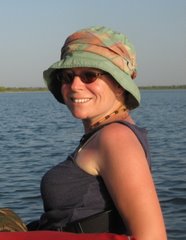
I arrived home two weeks ago already, but didn't have the time / energy to return and add my photos. In a few weeks I'll return to Cape Town for 2 months - and I expect that my blogging will increase again since I will have more time to do that sort of thing. And interesting observations to make!
Cape Town from Robben Island; with famed Table Mountain in the background. (I climbed that once).
Robben Island: the notorious Western Cape island prison, for political prisoners during the struggle, including Nelson Mandela.

The visit to Robben Island was excellent.
For me it was an emotional thing, to see the quarry where the leaders of the struggle spent their days, moving rocks from one place to another and yet still teaching each other to read, and leading the struggle. To see the cell, where Nelson

Mandela spent so many years of his life. To see how truly shamefully we humans are capeable of treating one another on the basis of the colour of someone's skin.
A Canadian colleague recently mentioned that in the late '80s / early '90s he was hardly aware of what was happening in South Africa. From what I remember, it was hardly covered in the western media so you had to be interested to know what was going on. I remember it - seeing news footage of riots in Soweto, hearing of the school strike, seeing masses of youths doing the toyi-toyi.
But it didn't seem real, in a way. But when I now am spending time in South Africa, I am humbled by the strength and determination of those involved in the struggle.
The ex-political prisoner who was our guide talked about how the guards worked to 'divide and conquer', driving wedges between prisoners using access to 'luxuries' such as newspapers, extra meat. He showed enlarged mockups of the cards that ruled everything in their lives.

Even in prison, there were huge differences between how the apartheid-defined racial groups were treated. I just have so much trouble understanding how an entire country was run on those bases for 50 years - true democracy only started in 1994 in South Africa!
As I continue to work in South Africa I will surely learn more about it; but as a privileged, white foreigner will never be able to truly understand.
 In a disused boiler house, Nils Groebler and his colleagues have built the Emporium of Care - what started out being an ARV treatment program now has ARV treatment plus income generating activities, skills development, VCT, spiritual care, a playroom for kids and the newest project is a community garden. The tables you can see in the foyer are part of the tea shop - a place for PLWHA (People Living with HIV / AIDS) to sit and chat with people who really understand what they are going through.
In a disused boiler house, Nils Groebler and his colleagues have built the Emporium of Care - what started out being an ARV treatment program now has ARV treatment plus income generating activities, skills development, VCT, spiritual care, a playroom for kids and the newest project is a community garden. The tables you can see in the foyer are part of the tea shop - a place for PLWHA (People Living with HIV / AIDS) to sit and chat with people who really understand what they are going through.




 Even in prison, there were huge differences between how the apartheid-defined racial groups were treated. I just have so much trouble understanding how an entire country was run on those bases for 50 years - true democracy only started in 1994 in South Africa!
Even in prison, there were huge differences between how the apartheid-defined racial groups were treated. I just have so much trouble understanding how an entire country was run on those bases for 50 years - true democracy only started in 1994 in South Africa!